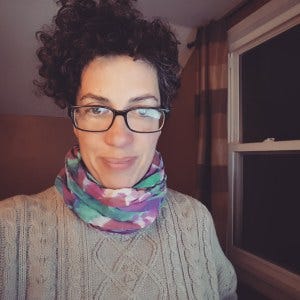Protecting Your Headspace

I don't know how other writers work, but I need quiet and stillness when I write. Not quiet as in no sound, but quiet as in no drama. No voices other than the ones in my head that I channel onto the page. No energy or time sucking people or activities. No negative energy. This is how I create the headspace that allows me to feel free and relaxed and courageous enough to write.
These days, with two part-time jobs, two dogs, a house, and a community, not to mention all the news, it's really challenging to create, let alone maintain, that space. I have always been an easily distracted and slow writer. It takes several uninterrupted hours to get into that space, that sweet spot when what I'm writing is within me, and I am within it, and we are sort of vibrating off one another all day, like lovers.
When you're in that space, you can't wait to get back to the computer, you daydream about what you're writing, you dream about it at night, you wake up thinking about it, and rearrange your life so that you can be with it on a regular basis. Back in the day, I used to get obsessed and disappear for weeks when I was really into writing something. There was also no internet then, or less of it. But that kind of frenzied obsession isn't sustainable long-term, nor is it healthy. In any case, now I have responsibilities that don't allow that kind of abandon.
All last year I was craving that headspace, but there was simply too much going on. This year will be different, is already different.
It started last weekend.
Except for a couple of previously scheduled engagements, I didn't venture out, even on New Years Eve. I actually found it liberating to stay home and avoid all the hub-bub, or what Kaz used to call Amateur Night. All the power to people who go out and party it up, I used to do the same. This year, however, it was important to me to spend the first moments of the new year being productive and writing.
I sent out my Happy New Years messages early, turned off my phone, and stopped listening to the radio. The town was quiet because of the cold weather, and people being hungover, so when the dogs and I ventured out, we didn't see anyone. I stayed away from Main Street entirely. It's only three blocks away, but three blocks can be far enough in a small town.
All these moves shaped the weekend into a mini writing retreat. I got a lot done. More importantly, this concentrated time allowed me to get into that space. I was able to focus and think about my goals, and what it will take to nurture and maintain the headspace that will facilitate achieving them:
Establish a writing schedule, and stick to it like any other work schedule, meaning don't schedule meetings or make other plans during scheduled writing time, don't accept invitations, make phone calls, watch television, or surf the internet. Write after work from approximately 7 to 10 at night Mondays through Thursdays, write a blog post on Friday night, socialize, catch up on house chores and run errands on Saturday, and write all day Sunday. There will be exceptions here and there, but that is the actual schedule.
Hang out with other writers. Strength in numbers. Support systems are everything. I just joined a new monthly writer's group with a few friends. Our first meeting is in three weeks!
Read more. Writing improves when reading a good book. I am currently reading The Handmaid's Tail by Margaret Atwood, and Delta of Venus by Anais Nin, about one chapter per night before falling asleep.
Watch movies (sparingly, as reward) instead of television shows. Movies are shorter, require less time commitment, and tell stories more succinctly. As a filmmaker, it's good for me to remember visual storytelling, not just literary.
Exercise every day. Eventually, I'd like to do more, but right now I walk and hike with my dogs.
Part ways with any situation or person that messes with headspace. This can be challenging because it's not always easy to recognize, and telling people without hurting their feelings is tricky. I recently told two people that I needed to pull back a little, and was honest about why: I'm focusing on my writing these days, and something about this situation is stressing me out, so I have to pull away for the time being. Both seemed to understand and not take it personally.
If I can't actually part ways with a situation, then reorient to that situation and learn how to coast. This doesn't mean stop caring or trying, but rather stop being attached to the outcome. I am over here. The situation is over there.
Stick to the routine as much as possible. Do not deviate.
Take myself seriously. If I don't take myself seriously, why would anyone else?
All one needs to know about writers is, they need to write in order to be happy.
Here's a list of 10 famous writers and their writing routines (the last one is hilarious).
How do you protect your headspace?

